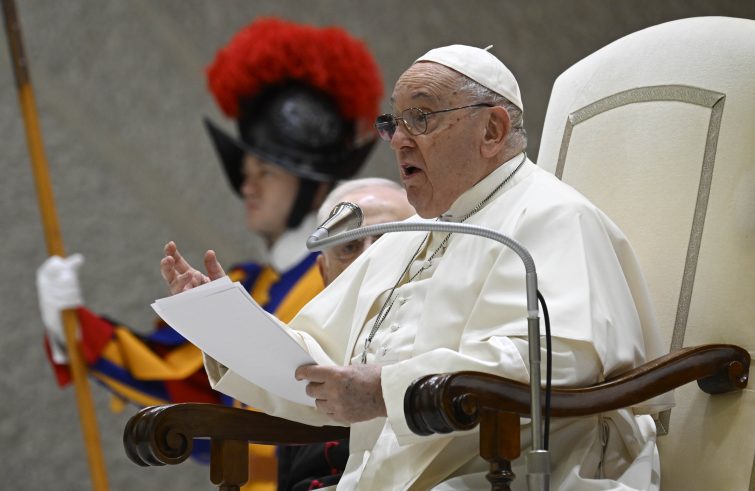
“Let us go before the Nativity scene and ask Jesus for the gift of peace!” With this appeal, Pope Francis concluded the traditional Wednesday general audience dedicated to the 800th anniversary of the Nativity scene set up by St Francis in the town of Greccio in 1223. In his greeting to the Italian-speaking faithful, the Pope expressed his closeness to the people of China, hit by a “devastating earthquake”, and then greeted the Mediterranea Saving Humans group attending the audience: “You are doing a great job, you are saving so many people!” Francis thus turned his remarks to the ongoing wars:
“Our thoughts go to Palestine, to Israel, to the martyred Ukraine, which is suffering so much. And to the children in the war.”
“If we Christians look at the crib as a beautiful thing, as something historical, even religious, and pray, this is not enough”, Francis said in the opening lines of the catechesis: “Before the mystery of the Incarnation of the Word, before the birth of Jesus, we need this religious attitude of amazement.
If I, in the face of the mysteries do not come to this amazement, my faith is simply superficial; a ‘computational faith.’”
“How did the crib come about? What was St Francis’ intention?”, Francis asked, citing the words of the Saint of Assisi, who said: “I want to depict the Child born in Bethlehem, and in some way see with the eyes of the body the hardships in which He found Himself for want of the things necessary for an infant: how He was laid in a manger and how He lay on the straw between the ox and the ass.” “Francis doesn’t desire to create a beautiful work of art, but through the Nativity scene, to provoke amazement at the extreme humility of the Lord, at the hardships He suffered, for love of us, in the poor grotto of Bethlehem”, the Pope remarked: “I have emphasized one word, ‘amazement.’ And this is important”, Francis added off text.
“The Nativity scene it was conceived as a school of sobriety. And this has a great deal to say to us”,
Francis said. “Today, in fact, the risk of losing sight of what counts in life is great and paradoxically increases precisely at Christmas immersed in a consumerism that corrodes its meaning”, the Pope remarked. “It’s true, that you want to give presents, that’s fine – he added off text – but that frenzy to go shopping that draws attention elsewhere and there is not that sobriety of Christmas. Sometimes there is no inner space for astonishment, but only to organise the parties.”
And the Nativity scene was created “to bring us back to what matters: to God Who comes to dwell among us. It helps us understand what matters and also the social relationships of Jesus in that moment, the family, Joseph and Mary, and loved ones, the shepherds.”
“People before things.
The Pope reminded the faithful: “often we put things ahead of people. This doesn’t work.”
“But the Nativity scene of Greccio in addition to sobriety, speaks also of joy. Because joy is a different from having fun.” Francis pointed out: “having fun is not a bad thing, it is a human thing. But joy is deeper still. More human. And sometimes there is a temptation to have fun without joy; to have fun by making noise, but the joy is not there. It is a bit like the figure of the clown, who laughs and laughs, and makes people laugh, but the heart is sad.” “Sobriety, amazement, leads you to joy, true joy, not artificial joy”, Francis continued off text: “But where did this Christmas joy come from? Certainly not from having brought home presents or having experienced lavish celebrations. No, it was the joy that overflows from the heart when one tangibly touches the nearness of Jesus, the tenderness of God, who does not leave us alone, but consoles us.” “Closeness, tenderness, and compassion, such are the three attitudes of God”, Francis reiterated in unscripted remarks: “And looking at the Nativity scene, praying before the Nativity scene, we can experience these things of the Lord that help us in every day life.” “the Nativity scene is like a small well from which to draw the nearness of God, the source of hope and joy”, the example chosen by the Pope: “The Nativity scene is like a living Gospel, a domestic Gospel. Like the well in the Bible, it is the place of encounter where we bring to Jesus the expectations and worries of life”, the final recommendation: “If, before the Nativity scene, we entrust to Jesus all we hold dear, we too will experience great joy, a joy that comes precisely from contemplation, from the spirit of amazement with which I go to contemplate these mysteries. Let us go before the Nativity scene. Look, everyone, and allow your heart to feel something within.”












